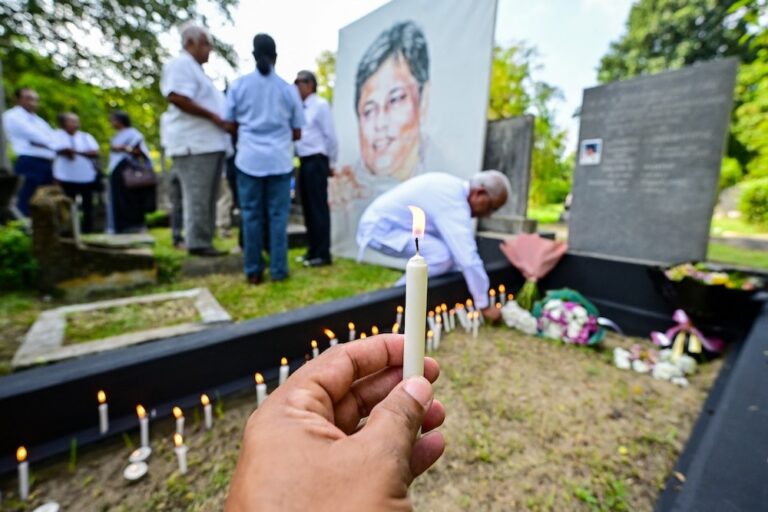(FMM/IFEX) – The following is a 31 October 2007 FMM press release: A despicable gazette notification and its impact of media freedom in Sri Lanka The Free Media Movement (FMM) expresses its dismay that the Government of Sri Lanka put out a gazette prohibiting news reporting on proposed military operations in the country. It was […]
(FMM/IFEX) – The following is a 31 October 2007 FMM press release:
A despicable gazette notification and its impact of media freedom in Sri Lanka
The Free Media Movement (FMM) expresses its dismay that the Government of Sri Lanka put out a gazette prohibiting news reporting on proposed military operations in the country. It was issued under the emergency regulations and called “Prohibition on publication and transmission of sensitive military information”. The gazette would have made it illegal to report material “which pertains to any proposed operations or military activity as well as plans to buy equipment for security forces or the police.” Under the terms of those regulations, editors could be jailed for up to five years for breaking the censorship, together with a fine not exceeding US$50.
In a release issued on 24 September 2007, FMM stated: ‘The Free Media Movement (FMM) reliably learns that the government is preparing to promulgate new Emergency Regulations to impose a general prohibition on investigative reporting and media coverage in respect of issues relating to defence procurement.”
It is now reported that the President has cancelled this gazette notification as he trusts the media will report responsibly. However, the fact that such a gazette was deemed prudent and approved by the President before he rescinded it is for the FMM a clear and damning marker of the understanding of and approach to media freedom by this government.
Since mid-October, media freedom in Sri Lanka declined with incredible and deeply disturbing rapidity. Journalist Kumudu Champika Jayawardana of the website: http://www.ethalaya.org was shot at around 11.45 p.m. (local time), on 30 October, in Colombo, on his way home from the office. The government’s closure of five FM radio channels belonging to ABC Networks was without any due process or proper investigation. Highly placed government officials as well as the defense establishment indulged in vicious verbal attacks against media that analyzed and investigated the Liberation Tigers of Tamil Eelam (LTTE) attack on the Saliyapura Airforce Base in Anuradhapura on 22 October. Finally, the arrest of Arthur Wamanan, a staff reporter of “The Sunday Leader” by the Criminal Investigations Department (CID) and the imbecilic racist arguments put forward by the Criminal Investigation Division (CID) in court proceedings against him indicate the degree to which media freedom has eroded in Sri Lanka.
The gazette prohibiting news reporting on proposed military operations in the country needs to be appreciated in this light: though now annulled, the supposed “trust” in the media by the President and this government is in reality a thinly veiled threat to freedom of expression and media. The FMM has for years condemned the total lack of media freedom under the LTTE and other paramilitary groups including the Eelam Peoples’ Democratic Party (EPDP) and the Karuna faction in the North and East of Sri Lanka. Sadly, the same is true of media in the South. This government only “trusts” and finds “responsible” media that is servile and sycophantic. Journalists who in the public interest engage in investigative reporting are intimidated, threatened, shot, killed and censored. Media and human rights activists are branded as unpatriotic and LTTE sympathisers.
The proposed gazette would have resulted in local and international condemnation of the government’s heavy-handed censorship. The fact that it is now cancelled is no measure of this government’s commitment to media freedom. The events since mid-October alone indubitably demonstrate the President and his government’s understanding of media rights and freedom.
Unequivocally condemning the proposed gazette, the FMM urges those in power to desist from actions antithetical to democratic governance and work instead to strengthen media freedom and freedom of expression.


